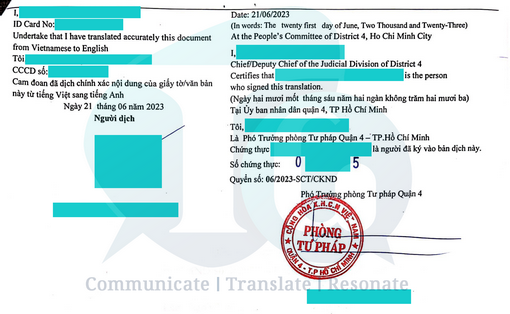When it comes to notarized translation, having an in-depth knowledge of the related procedures or choosing a credible translation agency, etc., can make it less time-consuming and costly for you. In particular, the notary translation statement is a crucial, non-skippable step in getting your documents notarized. However, not many people fully grasp the requirements of this special paper. What is a notary translation statement? How is it done? Let’s find out in the article below with Thao & Co.!
A notary translation statement is a certification that verifies the authenticity and legality of a document when it is translated into a foreign language. The notary at the district/city’s public notary office or a private notary office will be in charge of notarizing your documents.
The translator will sign and write their full name onto each page of the translation under the witness of the notary. Afterward, the notary’s testimony and signature will be placed on all translation pages. The word “Translation” will be put in an overlap position on the empty upper right-hand corner of every page. Then, the translation will be attached to the original copy and an overlapping seal will be placed on it.
For a notarized translation, the notary only verifies the translator’s identity and not the translation’s content. In Vietnam, according to Article 6 of the Law on Notarization, translators must graduate from college with a degree in foreign language or in another related major. For the latter case, adequate proficiency in the translating language will be required.
Translators will also have to ensure that the translated text is accurate and appropriate. In particular, the document being translated must not violate national laws or go against society’s customs and morality.
As the law stands, a legal notary translation statement must include the following elements:

A notary is a person who has been authorized by the government to issue a notary translation statement. Notaries are members of the judicial branch and work at a notary office. They are responsible for dealing with legal matters such as signing, stamping, and notarizing certificates as well as documents pertaining to personal, real estate, marital, business, etc. issues.
According to Vietnam laws, a notary must meet all of the following requirements: Is a Vietnamese citizen, permanently residing in Vietnam, and has a bachelor’s degree in law. Additionally, the notary must attend a notary course and pass the final test before being eligible for a notary position.
Evidently, a notary is authorized by the government to notarize documents. However, they are by no means language experts. Consequently, it is recommended that you choose a credible translation agency capable of delivering high-quality translations with its own team of expert translators before notarizing your documents.
As activities such as studying abroad, immigrating, or conducting business on a global scale surge in popularity, the notarized translation service was created to meet market demands. Documents translated into a foreign language must not only be accurate but also obey the requirements of the Law on Notarization.
For example, before you can acquire work permits for foreigners, it is necessary to have the following documents notarized:
In certain cases, the notary may not acknowledge and notarize the translation if it violates these regulations:
If you are still wondering whether a notary translation statement is the same as certification of translation accuracy, the answer is No.
To elaborate, a certification of translation accuracy will be supplied by the translator or the translation agency. On the contrary, a notary translation statement is issued by the notary – who has been authorized by the government.
Certification of translation accuracy is compulsory before notarization can be done to ensure that your document obeys the requirements of the Law on Notarization.

Note: It is important that you fully understand the differences between certified and notarized translation to avoid unwanted problems.
Depending on the translation agency, you may need to pay for the certification fee. However, at Thao & Co., one of the most credible and professional translation agencies, this paper will be provided to you free of charge. On the other hand, the notarization fee will be affected by the type of your document, the number of pages it has, and the issuing notary office.
As demand for notarized translation service increase, Thao & Co.’s team of professional translators will accurately translate your documents and acquire the notary seal quickly and conveniently. Furthermore, the proprietary platform at Thao & Co. allows you to effortlessly track the translation progress and connect with our translation team should the need arise anywhere, anytime.
Thao & Co. is the finest choice you can make to receive a professional and accurate translation for an affordable price.
To receive a free consultation, visit us at Thaonco.com and leave your information on the Get a Quote page!
Discover more at: https://thaonco.com/notarized-certified-translation